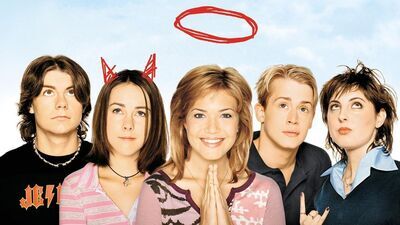Mary’s response to Hilary Faye in this farcical moment of attempted conversion is probably the film’s most resonant and the one that is most relevant to evangelical bullying today. “This is not a weapon,” she tells Hilary Faye almost wearily, indicating the Bible she just used to hit a pregnant woman. As much as Hilary Faye claims how happy her relationship with Jesus Christ makes her – and she says it on a daily basis, almost as though he’s her first boyfriend she can’t stop gushing over – she’s the angriest person in the entire film.
The burden of being a perfect Christian soldier does no one any good: It sends Dean to conversion camp, gets Mary pregnant, and leads Hilary Faye to drive herself headfirst into a giant statue of Jesus. The more she attempts to shape others to meet the heavy demands of her faith, the more damage she does to the thing she professes to love. Evangelical Christianity, in the eyes of “Saved!,” sets people up for failure and argues that it’s impossible to be a perfect Christian without killing something vital within yourself.
That said, “Saved!” also creates an example of what it looks like to have reconciled these two contradictory elements of faith and social progress, the difference between what we are taught and what we actually believe. Mary’s love interest, Patrick (Patrick Fugit), is a Christian, raised by the school’s pastor, no less. But his missionary efforts are mostly just an opportunity for him to be part of a skateboarding tour, and unlike many of his classmates, he’s not exactly the fire and brimstone. He doesn’t judge Mary for being an unwed mother-to-be or for having sex before marriage, nor does he blink when Dean and his new boyfriend show up at the prom. He – along with Cassandra and Roland (Macaulay Culkin), Hilary Faye’s disabled brother – represent a kinder, more laissez-faire attitude that has defined the generation of teens who grew up alongside “Saved!”
Though it mocks evangelicalism in general, “Saved!” reserves its most damning commentary for the most fervent, unyielding, and cruel characters, like Hilary Faye. By doing so, it gives those audience members who were part of a Christian community a way to navigate a changing world with kindness, showing that even in a film designed to poke fun at evangelicalism, there’s a way to embrace social change without necessarily shedding all ties to faith.

